“People who are supposed to protect you from monsters, turn out to be monsters themselves”. ‘Gerald’s Game’ is another glittering entry into Mike Flanagan’s illustrious filmography. Based on Stephen King’s novel of the same name, ‘Gerald’s Game’ revolves around a romantic get-away gone wrong and a captive woman’s attempts to evade “Death”. King’s novels have seen numerous adaptations on screen. The prosaic beauty of his text lies in his often understated, intense character-studies offering deep insights into the human mind. It is not often, then, that a Stephen King adaptation outperforms a Stephen King novel. Flanagan achieves this rare feat in a triumphant effort with the amazing Carla Gugino as the centrepiece of this taut psychological thriller.
The pair, fresh off their success with ‘The Haunting of Hill House, successfully weaves an overwhelming tale of secrets from the past and the confrontation with them in the present. Flanagan’s craftsmanship elevates ‘Gerald’s Game’ and makes it more than a mere captivity thriller. The film is able to recreate the essence of the literary work, doing justice to King’s penchant for using monsters to solve real-life crisis (if you get it). The film’s minimalistic setting proves to be no hindrance for Flanagan’s vision and brilliance. It instead acts as a narrative tool for him to bind the story in a claustrophobic maelstrom of suppressed feelings, past ghosts, and real-life horror. This analysis dissects the film and explores the meaning of recurring motifs in it and the cheerful ending that brought us to our knees.
Synopsis

Gerald and Jessie are a married couple, albeit unhappily. The pair has gone through a rough phase but has overcome it successfully and looks to start a new phase in their life with a romantic getaway. Gerald takes Jessie to an isolated cabin in the woods, along with props to spice up the narrative in this romantic chapter. On the way, they almost run over a dog on the road, feeding off of the corpse of a rat. When they reach the cabin, a worried Jessie offers the hungry dog some food. As Gerald takes her inside, they forget to lock the door. During Jessie’s brief visit outside, Gerald takes a viagra pill and then takes another one in front of Jessie. He cuffs her to the bed, rendering her incapable of freely moving her hands. Gerald then proceeds to act like a stranger and fulfill his weird rape fantasy using Jessie. After she rebukes his efforts to do so, Gerald has an untimely heart attack and dies on her.
The now chained Jessie fears for her life and tries desperately to get away, albeit unsuccessfully. The open door lets in the dog they encountered on the road. He is drawn to Gerald’s blood, and despite Jessie’s best efforts to keep him away, he takes a chunk out of his hand. Suddenly, Gerald wakes up, complaining about Jessie’s indecisiveness in acting to rescue him. A startled Jessie discovers the resurrected Gerald-like figure as a hallucination, which is furthered by a figure of her, trying to neutralize Gerald’s pessimistic comments. At her disposal, Jessie finds a glass of water, the price tag from her new night-slip, and suppressed feelings which quickly surface, inundating her in guilt, fear, and shame.
As the sun sets down, she sees a scary man in the room holding a trinket with jewels in it. She calms herself down and assures herself of the figure’s imaginary existence. She quickly falls asleep due to the exhaustion, and we’re taken to Jessie’s day on the lake house as a child. A fear of water keeps her from joining her family on the boat, forcing her father to stay back with her. As they watch the eclipse on the swing, her father reminisces the time she used to sit on her lap. Jessie, in a bid to see her father happy, hesitantly obliges. As she watches the eclipse, Tom, her father, starts masturbating, making Jessie uncomfortable and disgusted. Tom manipulates her into silence, drowning her in fear of the consequences to his marriage and the family’s peace if she spoke out.
Now awake, a cuffed Jessie is pointed towards bloody footprints of a human shoe, assuring her of someone’s presence the previous night. She starts losing all hope, encouraged by Gerald’s ghost to give up and “make it easy on herself”. As she fades away, the 12-year old Jessie reminds her of what happened after her mother returned. At dinner time, young Jessie breaks a glass out of nervousness and anger when her mother asks about the eclipse. This hints the older Jessie toward using the glass of water kept on the ledge above to slit her hand and breakthrough. “Blood is as slick as oil before it clots”.
Overcoming initial reluctance and hesitation, Jessie decides to go through with the plan and successfully gets out of the cuffs. She desperately bandages up her wounds and scampers for water. But, due to bleeding and exhaustion, she soon faints. She wakes up to the dog trying to tear off her wounded arm. After shooing her away and retrieving the car keys, Jessie faces the Moonlight Man again. She confidently walks up to him and hands him her wedding ring. The Man, apparently satisfied, lets her walk to freedom. A drowsy Jessie crashes the car and awakes the neighbors.
Six months later, Jessie writes a letter to herself, revealing that she used the insurance money to open a foundation that helps children who’ve suffered sexual abuse. It is also revealed that the Moonlight Man was, in fact, real (that’s why the police couldn’t find her ring). The said man, suffering from acreage, was a serial killer on the loose (as revealed in the opening minutes on the radio), who dug up graves and desecrated the corpses, at times eating off the faces of male bodies. Jessie goes to confront the man in Court, who greets her jubilantly and says “You’re not real” (repeating Jessie’s words from the cabin). As she inspects him closely, she says You’re so much smaller than I thought” and walks off in the gleaming sun.
The Moonlight Man
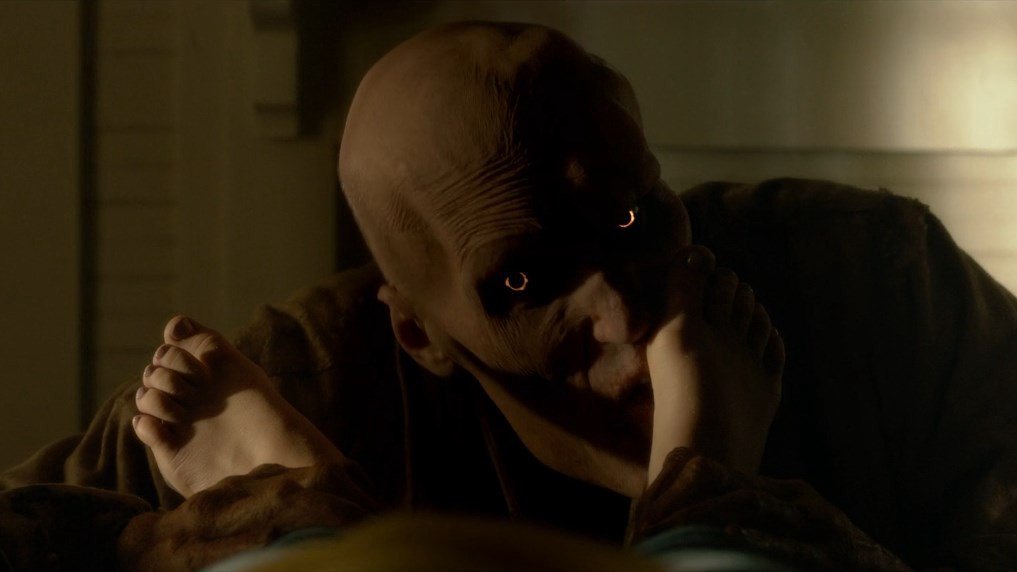
The Moonlight Man, or the serial killer as is revealed in the end, was utilized as a significant narrative tool by Flanagan. The book dealt with serious issues such as depression and sexual abuse, prompting many to draw comparisons to King’s previous works. King, renowned for his horror genre mastery, put many in a quandary, including Flanagan, and added a new dimension to his writing style. The director was so taken aback by the novel that he even branded it as “unfilmable”. An extract from an interview reads:
“…the crux of the story is her experience of trying to think her way out. And that’s so hard to convey cinematically. The book is arresting in that way. You are her, and it’s a very visceral and challenging experience to read. When I put it down, I was breathless, and I had goosebumps. I was like, “Goddamn, that’s one of the best, most immersive reading experiences I’ve ever had. And it’s unfilmable.”
The Moonlight Man is a creation of Flanagan, rather his interpretation of King’s character. The novel calls him the Space Cowboy and introduces him in a harrowing fashion as “a man standing in the darkened room’s corner, where the wind-driven shadows of the pines danced wildly in the nacreous light falling through the skylight” (emphasis added). In the retelling of Jessie’s traumatic tale, Flanagan memorializes the Moonlight Man as a symbol of patriarchal dominance in her life, as is evident from the courtroom scene. As the judge indicts the killer, we see Jessie face up against him. First Tom replaces his face then Gerald in a series of reverse shots. This symbolic significance of the Moonlight Man assumes shape only in the climax. It is a representation of all the monsters that Jessie has faced and now overcome, in her life. Her past life, as troubled as it had been, kept her a prisoner in time, chained by her silence and the habit of running away. Jessie, though, confronted the Man in the corridor as she was about to leave and in the process, finally took a step in ending the sundown period in her life forever.
The Letter
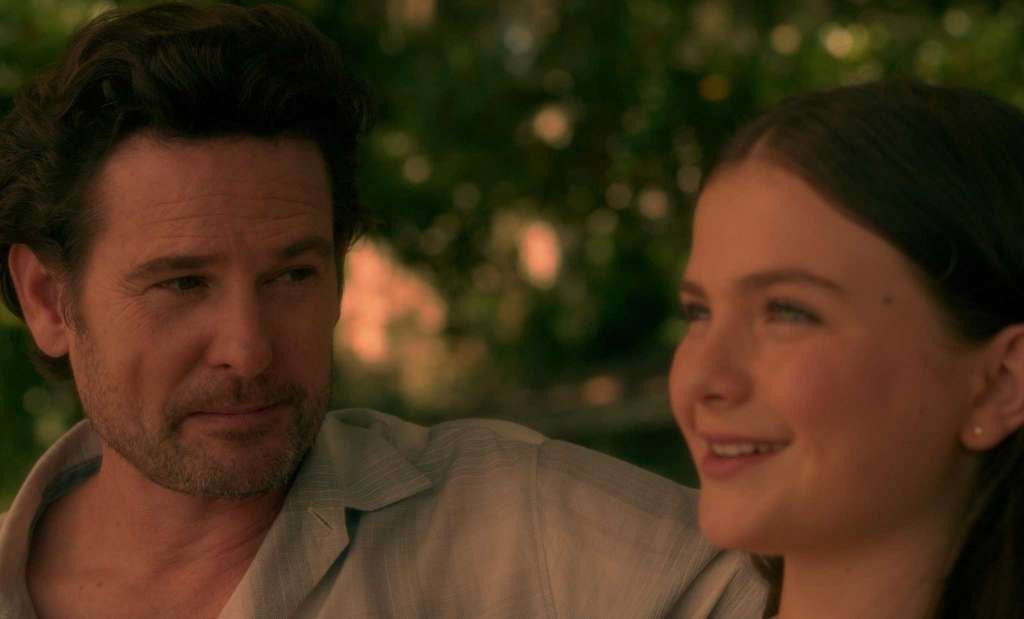
The post-house timeline starts with Jessie writing a letter to her 12-year old self. The letter is more like a diary of sorts, written to relieve the burden that she carried for years. Many commentators have said that the letter was written with no clear intention by Jessie. She didn’t want to thank herself for saving herself. That would be ridiculous. The book had Jessie address the letter to her roommate, Ruth. But she is absent from the film. Instead, Jessie’s letter, in the end, was a mouthpiece to millions who’re suffering at the hands of their abusers.
One of the underlying themes in the book as well as the film is that of sexual abuse. King dedicated the last 50 pages of his novel to the “coda”. Flanagan and co-writer Jeff Howard keep the epilogue mostly intact but change its meaning. It is Jessie’s catharsis, a moment of realization that she is in charge of her life, and that people who’ve wronged her and used her, are mere episodes, not the epoch of her life. In an interview, Flanagan explains his decision to conduct the ending in the way he did.
“It was something when I read the book that I loved. I know it was polarizing with fans of the book, so the people that hated that epilogue in the book are going to hate it in the movie. I fully expect that [the epilogue is] going to be the lightning rod for people to be like ‘Oh I was so into it and then (groans) that ending.’ But that’s what happened in the book. There was never a time where it felt right to do the film without that ending, for better or worse.I thought that we needed to have her confronting a physical embodiment of all the male perversion that she has dealt with in various forms from various people throughout her life. I wanted to take all of that male gaze and the dirty nastiness that she’s gone through and put it all into skin”.
The letter is akin in meaning and importance to the well which Jessie dreamed. A direct reference to Dolores Claiborne, another King character, the well symbolized a place where Jessie dumped all her secrets and was entangled in them, unable to free herself. The perversions that she has born all her life have limited her attitude to life. She finds herself bogged down by pessimism and negativity, as was evident by the hallucinated Gerald. But she still carried a part in her that willed her forward, represented by the hallucinated Jessie.
The Eclipse
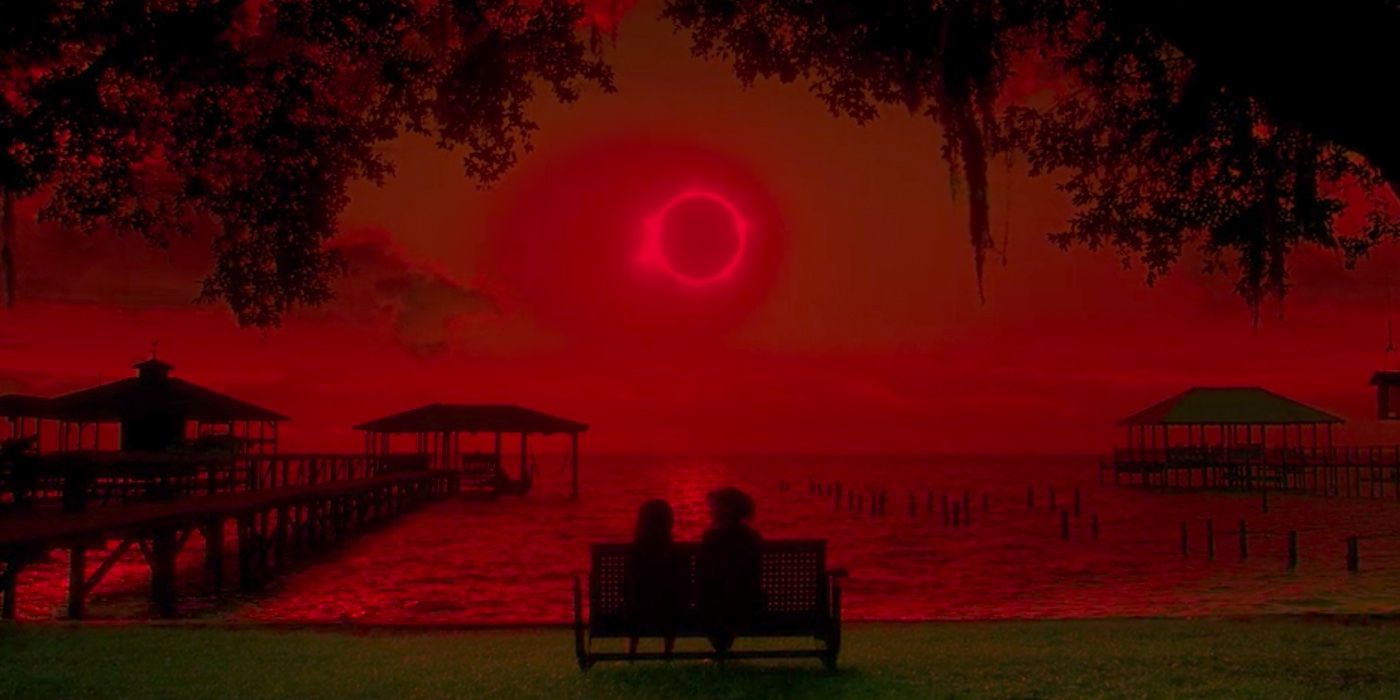
By far the most important metaphor in the film was the eclipse. Jessie’s abusive father proved to be an obstacle too important for her to champion. Even though Tom achieved Jessie’s silence through manipulation, Jessi relinquished her childhood to keep the family together. This dichotomy between the motives of the two characters is what gives rise to the eclipse in Jessie’s life. The foreshadowing of the sun is a symbol of Tom’s shadow on Jessie’s life. The trauma that she went through on that day at the lake house is unparallel to any other she has ever experienced. As is the case with many victims, Jessie blocks her memories of the day out and prefers to keep her feelings suppressed inside of her. They only come out when the voices in her head, the sub-conscious mind, take over.
Henry Thomas, who plays Tom, played Hugh Crain, Carla’s character’s husband, in the recently released Netflix series, ‘The Haunting of Hill House’. In his small appearance, Thomas entices with enough layers and materials for a possible sequel revolving around Tom’s abusive character. It is difficult to judge Tom in such a short time, though his actions can never be justified. Even for a monster like him, his moment of weakness surely humanizes the emotions he feels. His shame at the act is well-founded and is rooted in his fatherly instincts to protect his daughter.
The Ending
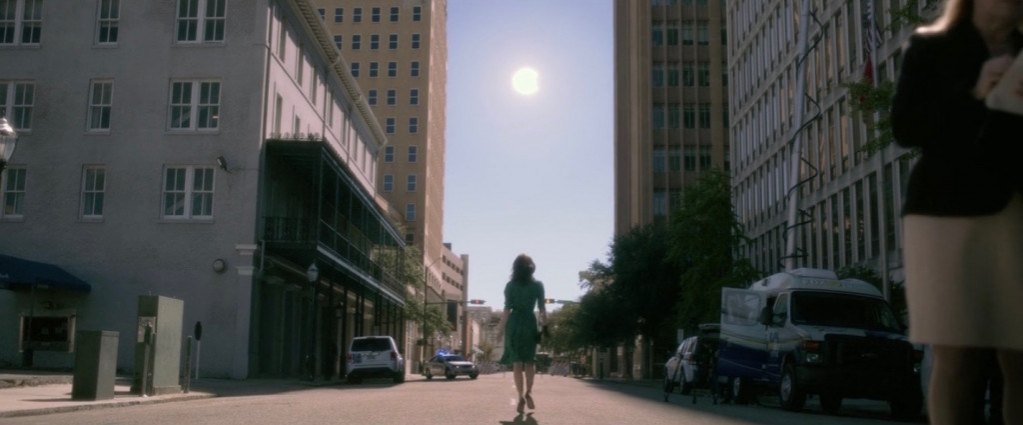
The film’s ending differed greatly from the novel’s. While King’s troubled protagonist storms into the courtroom and spits on the Moonlight Man (a.k.a Space Cowboy), Flanagan’s redeemed and assured Jessie spites the monster and moves on in life. Throughout her life, Jessie has faced the other way whenever she is probed to confront the demons of her past. But when it comes to her life, she is left with no choice other than facing the deep-locked away lies and secrets. With Gerald still belittling her for being a coward, her self-projected hallucination, a confidant, sharper Jessie urges her on and acts like her life support. This strengthens Jessie’s resolve to get out of the house to safety, catalyzing her dormant and to this point, non-existent will to find a way.
Tom forlorns her future, eclipsing her life with his nefarious shadow. He is a figure that Jessie hasn’t been able to brush off. The haunting memories of the day still hover over her head like an ominous cloud ready to burst. She carries this burden with her into her marriage with Gerald, who shares a similar dynamic with Tom. The Jessie in her head points this out to her in a scene where Gerald also discovers this event from her former wife’s life. The marriage with Gerald further aggravates Jessie’s pain and anguish from the lake house due to the similar backgrounds of the two males. This imposed toxic masculinity in Jessie’s life compel her to be a mere prop in the narratives weaved by her male counterparts. While her father’s shackle was Jessie’s silence, Gerald’s were his comfort. Getting caught between these two chaotic and deeply disturbing worlds subverted the light in Jessie’s life.
But after she confronts her demons and overcomes them, she realizes how small and pity they were. In the courtroom, when she goes up to the Moonlight Man, he changes faces and encompasses three distinct ghosts in her life: Tom, Gerald, and the man himself. And after emerging victorious over them all, she remarks, “You are smaller than I thought”. As she does this, she walks out with her sunglasses on with the sun shining brightly. This marks the end of the eclipse over Jessie’s life and the start of a new chapter. This ending scene is a testament to this thematic arch of Jessie’s character.

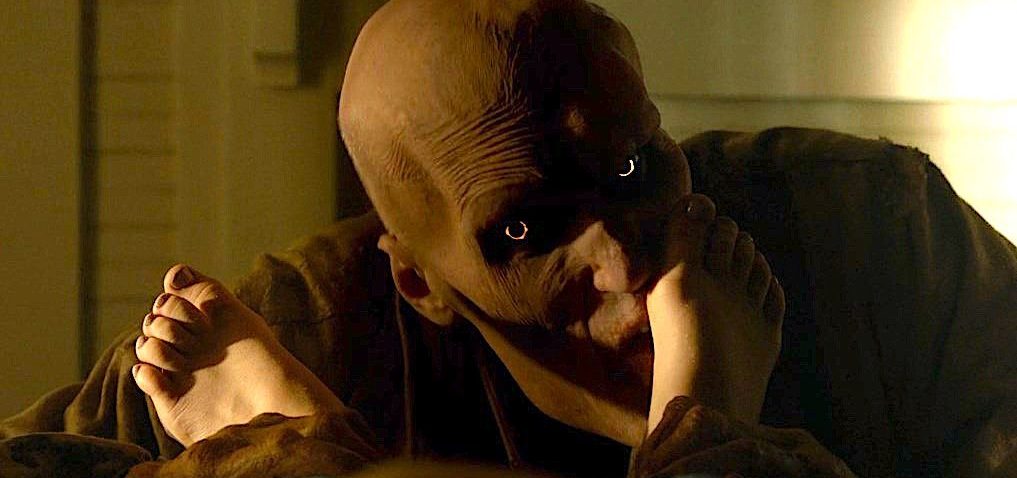
You must be logged in to post a comment.